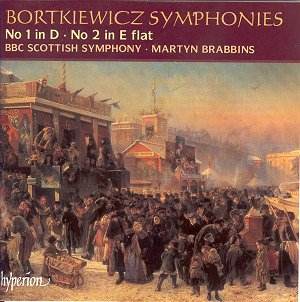The shade of Sergei Bortkiewicz is in the debt of Bhagwan
Thadani, Raymond Oke and Malcolm Henbury-Ballan just as much as that
of Gustav Jenner is to Professor Horst Heussner (see the recent CPO
boxed set of the Jenner chamber music on CPO 999 699-2). I owe it to
Mr Thadani that the sound of these two works was not completely unfamiliar
to me. I enthusiastically reviewed
Mr Thadani's and Mr Oke's CD of the sequenced simulation of these
two symphonies back in 1999. That was a case of faute-de-mieux but even
so the dynamic and vivid qualities of this music shone through the ersatz
sound quality.
Mr Thadani has recorded privately the complete surviving
piano music of Kharkov-born Bortkiewicz and many of the orchestral scores.
His and Raymond Oke's simulations using computer programmes and sampled
orchestral sounds have been the key to opening up these scores to today's
audiences.
The First Symphony (From my homeland)
declares, through its title, a remembrance of his Russian homeland recalled
from the leafy chaussées of Vienna. The work is fluently Tchaikovskian
with much aching nostalgia, upheaval and flighty comedy. There are Glazunov-like
tumbling high spirits in the scherzo and in the Allegro Vivace finale.
The scherzo resonates with the pizzicato movement of Tchaikovsky's Fourth,
with his Rococo Variations and with the finale of the Third Suite.
Russian Orthodox chant broods gloweringly through the Adagio
which also takes time to include reminiscences of the nostalgic yearning
of the first movement. The finale synthesises a wonderfully aspiring
Slavonic theme, typically Borodin in its topography, and marries it
with the Miaskovskian minatory voices of the abruptly imperious opening
of the work. This movement triumphantly rings the changes in a metamorphic
tumult of Glazunov-like victory (symphonies 5 and 8), imperial splendour
(1812) and Tchaikovskian melodrama (symphony 4).
The blindfold test might well place this symphony circa
1900 (if not earlier). On the evidence of the title you may expect music
which is relaxed and nostalgic but prepare yourself for drama too; especially
in the outer two of the four movements. This is most assuredly nostalgic
stuff but the edges are unsoftened, the drama is vivid and excitement
is built by a musician whose reverence for Tchaikovsky is clear. The
title may prepare you for the pictorialism of Raff or Rubinstein; the
music is quite other.
Bortkiewicz proves himself the Tchaikovsky disciple
again in the Second Symphony. This is even more urgently impassioned,
sullen and angry than its predecessor. It is often exciting, drawing
on the wellsprings of Tchaikovsky (Symphonies 4-5 and Francesca)
without being a pallid facsimile. The andante sostenuto is akin
to the final movement of Tchaikovsky 6 and builds a lapel-gripping atmosphere.
The finale sustains the excitement but its angst reacts with the same
impulsive Borodin-like music as appears in the finale of No. 1.
The silky sheen of the strings is pretty well put across
by the Scots; not that I cannot imagine it sounding even more sumptuously
radiant in the hands of say Ormandy and the Philadelphians or Mravinsky
and the Leningrad Phil had there been world enough and time in the 1960s.
The Scottish brass are gloriously hoarse and insistent.
Brabbins handles this music very well indeed and surely
we can look for him to be at the helm when Hyperion record Bortkiewicz's
Piano Concertos 2 and 3, the meaty Tchaikovskian Cello Concerto and
the much lighter Violin Concerto (the latter a forgotten travelling
companion to the Glazunov).
This disc has sprung onto the retailers' shelves with
astounding speed. The recordings were only made in February this year!
For those who use mind-maps you can place this disc
as a further dactyl off the limbs that carry recordings of Borodin's
Second Symphony, Tchaikovsky's 4 and 5, Glazunov's 4, 5, 6 and 8, Kopylov
and Arensky (better than Arensky and quite as good as the neglected
Kopylov on ASV) and Rachmaninov 2 and 3.
Documentation is what you would expect from this source:
encyclopaedic, well informed and laced with the adventurous spirit of
an investigative archivist. The author is Malcolm Henbury-Ballan, an
Indiana Jones of the world's music libraries. He it was who, by a chance
discovery, traced the scores to the Fleisher Collection in Philadelphia
where, more than half a century ago, Bortkiewicz had deposited the scores
and parts for safe-keeping.
'I can't wait to hear this with a real orchestra.'
So I wrote in 1999. Now we have my wish and handsomely delivered too.
Roll on the later Bortkiewcz instalments ... for surely they
will come!
Rob Barnett
BACKGROUND
Mr Thadani at Cantext Publications, 19 Laval Drive, Winnipeg, Canada
R3T 2X3. e-mail: bthadani@hotmail.com.
should be able to provide you with copies of CDs of his realisations
of the three piano concertos, the cello concerto and the violin concerto.
You could also ask for his 1996 translation (from the German) of Bortkiewicz's
autobiography.
The Bortkiewicz Society can be contacted at: bortkiewiczsociety@hotmail.com


